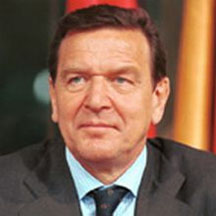BERLIN, (Reuters) – Former German chancellor Gerhard Schroeder yesterday called for the creation of a “United States of Europe”, saying the bloc needed a common government to avoid future economic crises.

Schroeder, a Social Democrat who ran the country from 1998 to 2005, said in an interview with Der Spiegel that European Union leaders were wrong to expect the euro to drive the bloc on its own.
“The current crisis makes it relentlessly clear that we cannot have a common currency zone without a common fiscal, economic and social policy,” Schroeder said.
He added: “We will have to give up national sovereignty.”
“From the European Commission, we should make a government which would be supervised by the European Parliament. And that means the United States of Europe.”
Schroeder, who nurtured a close relationship with France during his leadership, welcomed an initiative launched by German Chancellor Angela Merkel and French President Nicolas Sarkozy to move toward a fiscal union in 2012.
Their proposal, which would mean giving up sovereignty over budgetary policies with the aim to shore up the 17-nation currency union, has received a lukewarm response from other euro zone countries.
“Germany and France have sent a strong signal with the plan for a European economic government, if it is meant seriously and receives suitable authority such as a European finance minister,” Schroeder said.
“That is the correct way forward and the precondition for the correct funding — euro bonds,” he said.
Germany, which enjoys lower costs for issuing debt than its single currency partners, has led resistance to joint euro-denominated bonds.
“It is a huge bond market — speculators would no longer harbour hopes of splitting it up,” Schroeder said.
In order to initiate these changes, Schroeder said EU member states would have to return to the negotiating table and hammer out a new treaty to replace the one agreed in Lisbon that currently serves as the bloc’s institutional framework.








